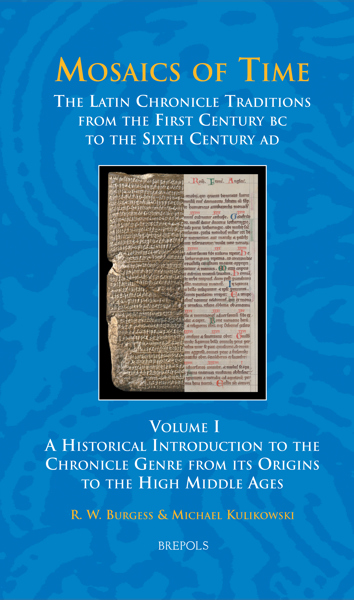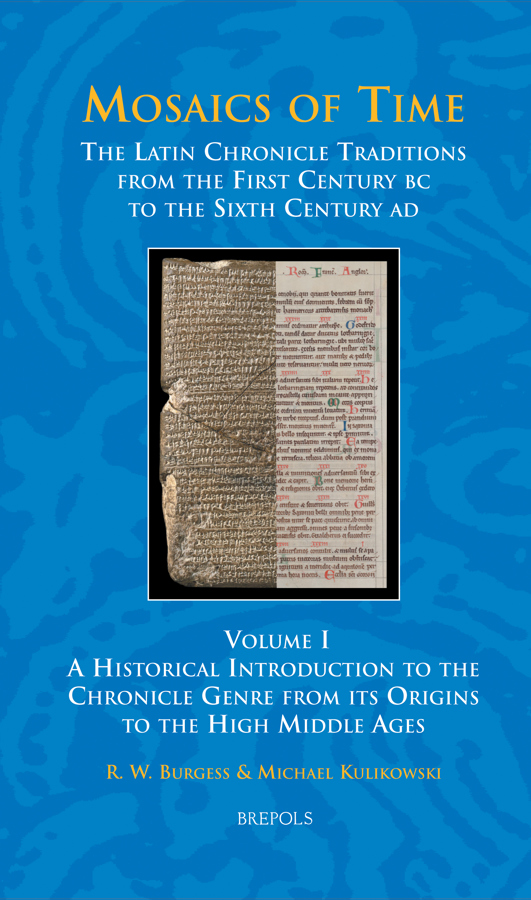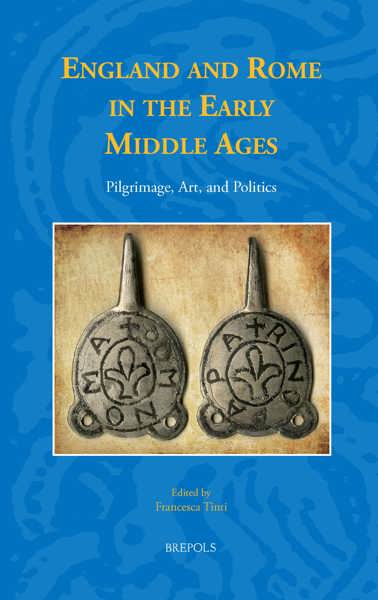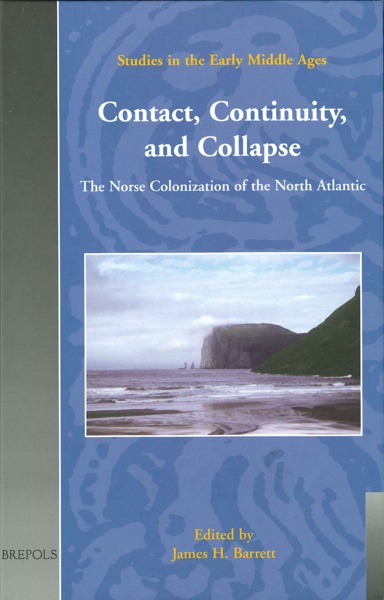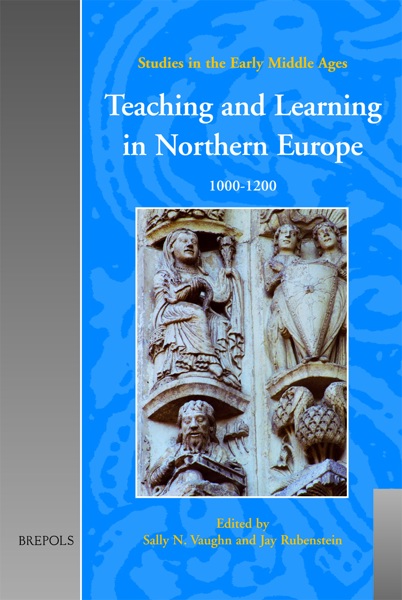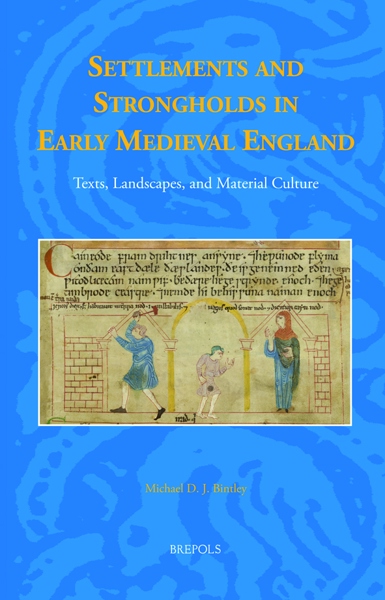
Mosaics of Time, The Latin Chronicle Traditions from the First Century BC to the Sixth Century AD
Volume I, A Historical Introduction to the Chronicle Genre from its Origins to the High Middle Ages
R. W. Burgess, Michael Kulikowski
- Pages: xiv + 446 p.
- Size:156 x 234 mm
- Illustrations:3 tables b/w.
- Language(s):English
- Publication Year:2013
- € 120,00 EXCL. VAT RETAIL PRICE
- ISBN: 978-2-503-53140-3
- Hardback
- Available
- € 120,00 EXCL. VAT RETAIL PRICE
- ISBN: 978-2-503-55905-6
- E-book
- Available
"Burgess' book is a very impressive bridge into the past through Chronicles and abridgments from the third to the fifth century, with copious references to the Byzantine literature and coins. The collection is a clear demonstration of how an accurate work of reconstruction of chronology results in a better understanding not only of historical accounts, but also of the sources used by the chronographers, upon which modern historians rely. Burgess' analysis in fact makes clear that Chronicles are important instruments for the understanding of Quellenforschung. Their concise wording hides fragments of historical works, some of them lost (e.g. KG). As a final result, this collection fully justifies Burgess' ambitious undertaking of a new systematic study of the ancient Chronicles in more volumes, which we are eagerly looking forward to have in our shelves." (Massimiliano Vitiello, in: Sehepunkte, 12 (2012), Nr. 3, [15.03.2012])
"Mit Spannung erwartet man daher die konkrete Anwendung der vorgestellten Genreeinteilung und ihre Auswirkung auf die Interpretation der spätantik-frühmittelalterlichen Historiographie in den drei Folgebänden." (Andreas Fischer, in: Sehepunkte, 13/10, 2013, [15.10.2013])
"It presents nothing less than a radical reinterpretation of the traditional taxonomies of premodern chronographical texts, from the most ancient evidence to the chronicles of the High Middle Ages. For this reason, this book is essential reading for all premodern scholars who base their research on "historical" sources (chronicles, annals, breviaria, etc.) and especially medievalists, whose traditional nomenclature for these sources does not take into account the ancient origins of the genre. (...) This is one of those rare books that speaks across the disciplinary and institutional boundaries that separate ancient and medieval historians. Research libraries would be wise to invest in this important work of scholarschip because its contribution is sure to endure." (Scott G. Bruce, in: Bryn Mawr Classical Review, 2014.05.17)
"This volume, notably readable considering its comprehensiveness of reference and general complexity, is an important moment in the study of the chronicle and historiography in general: it deserves a wide readership among scholars of both the ancient and medieval worlds" (Gavin Kelly, in: The Journal of Ecclesiastical History, 65/4, 2014)
"This impressive volume (...) represents a robust challenge to the widely-held and largely unchallenged assumption that the medieval annals derived from notices embedded in the margins of Easter tables of the seventh and eighth centuries. (...) Apart from its value as a corrective to - indeed, a complete inversion of - the conventional explanation of the origins of medieval "annals," the wide scope of this volume (and a thorough index) will make it an excellent, albeit occasionally demanding, introduction to the chronicle in Antiquity and the Middle Ages." (William Adler, in: The Medieval Review, 2014, 14.11.28)
"This is an important book that will be the starting point for future research on chronicles by classicists, ancient historians, oriental scholars and medievalists. (...) with this book, B&K have considerably raised the bar for future scholarship on late ancient chronicles. We look forward to the next volumes of their series." (Peter Van Nuffelen, in: Latomus, 2015/1, p. 234-237)
"With significant insights in both its microscopic analysis of individual texts and its macroscopic panorama of the history of the chronicle genre, this book should be compulsory reading for anyone working in this field, as well as finding a wider audience in a number of related disciplines. This is a very valuable work of scholarship and the succeeding volumes will be eagerly anticipated." (Richard Flower, in: Journal of Theological Studies, 65/2, 2014, p. 772-774)
"These two volumes will prove fundamental resources for the study of the chronicles of late antiquity and the medieval period for some time to come (...) Overall, these are important volumes which serve different purposes. Chronicon will be more useful for reference and teaching about all kinds of medieval narratives, while Mosaics of Time will hopefully encourage new ways of thinking about chronicles. As noted above, the two books could profitably be read consecutively and should be purchased by any serious academic library." (J. Wood, in Al-Masāq. Journal of the Medieval Mediterranean, 27/3 [2015], p. 309-311, reviewing both this volume and Chronicon [BEEC 5], Turnhout, 2013)
"This is a truly outstanding book by a brilliant scholar with a capable colleague. Finally we have a volume to which we can turn to learn what is (and is not) a chronicle and for basic information about any such text we may encounter in our own work." (Alden Mosshammer, in: Peritia, 27 [2016], forthcoming)
"(…) by providing a medium that condensed wide sweeps of history into a more accessible form, chronicles filled an important intellectual niche for readers hungry for edifying tales from the near and ancient past." (Michael Edward Stewart, in Parergon, 33/2, 2016, p. 185)
"Als Chronik der Chronikliteratur kann dieser geschichtliche Überblick für sich stehen und ist als solche hoch zu loben. Beabsichtigt ist er jedoch auch und vor allem als Kontextualisierung für die Textausgaben der weiteren Bände, auf die man gespannt wartet." (Graeme Dunphy, in IASLonline [08.06.2017], http://www.iaslonline.de/index.php?vorgang_id=3722)
“This is an important book that will be the starting point for future research on chronicles by classicists, ancient historians, oriental scholars and medievalists (…) To conclude: with this book, B&K have considerably raised the bar for future scholarship on late ancient chronicles. We look forward to the next volumes of their series.”(Peter Van Nuffelen, dans Latomus, p. 234-237)
The multivolume series Mosaics of Time offers for the first time an in-depth analysis of the Roman Latin chronicle traditions from their beginnings in the first century BC to their end in the sixth century AD. For each chronicle it presents a comprehensive introduction, edition, translation, and historical and historiographical commentary.
Chronicles seem to be everywhere in ancient and medieval history. Now for the first time, R. W. Burgess and Michael Kulikowski present a diachronic study of chronicles, annals, and consularia from the twenty-fifth century BC to the twelfth century AD, demonstrating the origins and interlinked traditions of the oldest and longest continuing genre of historical writing in the Western world. This introductory volume of Mosaics of Time provides both the detailed context for the study of the Latin chronicle traditions that occupies the remaining three volumes of this series as well as a general study of chronicles across three millennia from the ancient Egyptian Palermo Stone to the medieval European chronicle of Sigebert of Gembloux and beyond. The work is an essential companion to ancient and medieval history, historiography, and literary studies.
Foreword
A Note on the Citation of Ancient and Medieval Editions
Chapter 1. Nomenclature and Genre
Chapter 2. Early Chronicles in the Mediterranean World
Chapter 3. Apologetic Chronography and the Chronographic Works of Eusebius
Chapter 4. The Early Development of Calendars and Consularia
Chapter 5. Consularia and Chronicles in the Later Roman Empire
Chapter 6. Chronicles in the Middle Ages
Conclusion
Appendices
1. The Origin of the Term Χρονικά/Chronica
2. The Meaning of the Word Annales
3. Excerpts from Babylonian Chronicles
4. Excerpts from Pre-Christian Greek Chronicles
5. Excerpts from Roman Consularia and Chronicles
6. The Newly Published Leipzig Chronograph
7. Eusebius’s Sources for Secular History and the Identities of Cassius Longinus and Thallus
8. Livy’s Foundation Date
Appendices to the Footnotes
Editions and Translations of Important Texts
Bibliography
Index
